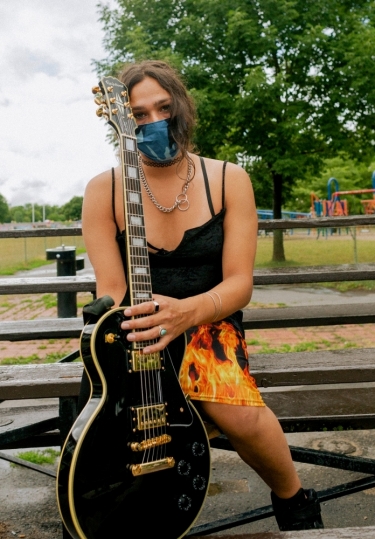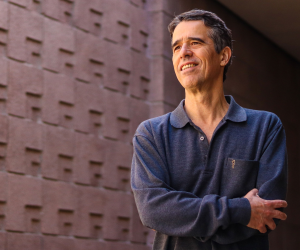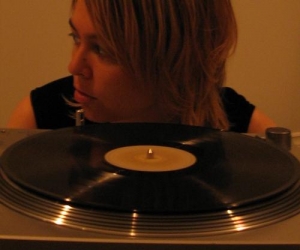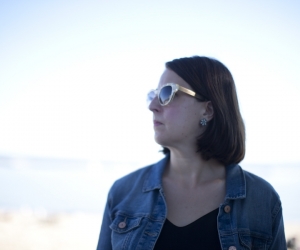
In her spellbinding live show, Montreal-based multi-instrumentalist Eliza Kavtion twists threads from documentary films, punk-rock distortion, and hip-hop innovation together with her wailing, virtuosic guitar playing. She and guitar become one: a fury of fuzzy drones, rhythmic sputters, and menacing loops, out of which emerge soaring melodies and defiant roars. Off the stage, Kavtion considers herself a mostly private person, but performing lends her a certain brashness: “For myself and for so many other kids who are introverted and play a loud, obnoxious instrument like the electric guitar, it’s a chance to really shine and say things in a dominantly expressive way that maybe we aren’t able to in our day-to-day lives.”
Her 2018 release The Rez That Svmmer features an image of a burning Mohawk home, with little else framing the sounds to come. The album opens with “Red Skeleton,” a piece that weaves together guitar-driven soundscapes and recordings of a myriad of dissenting voices made during the 1990 Oka uprising in her hometown of Kanehsatà:ke. The song reflects the personal importance of the uprising for Kavtion and articulates the contradictions that come with growing up in its aftermath: “Kanehsatà:ke is such an extreme place to grow up, because on one hand, it’s a very safe town . . . but on the other hand, the underlying modern segregation is really rampant, and the racism is really ugly.” The fleeting nature of safety in this small and stratified community is palpable in her music and reflects her desire to play out those feelings rather than necessarily speak them. “A lot of times people ask me about 1990 and I don’t even know what the right answers are. I almost project that confusion into the music—I feel paranoid and anxious and a lot of beauty and a lot of light from all directions. Kanehsatà:ke has definitely given me that perspective.”
Kavtion’s small-town upbringing colours her music in a number of ways. In her youth, she and her friends collected CDs and skate videos, scouring the liner notes for clues that would lead to their next alternative discovery. “I’ve just been a nerd my whole life, as far as being into anything fringe or extreme in the pop-culture realm.” Her interest in sampling came from discovering artists like Pete Rock and DJ Premiere in the credits of a Rascalz record. The techniques she heard in this music—the relentless beating of drum machines and the artful layering of samples using turntables—came to life in her own experimentations: “I was already attracted to the idea of making music through sampling, but I didn’t have access to those kinds of machines. I had always played instruments, and the idea of building my own samples with looping pedals and creating samples live—well, that’s kind of the genesis of all that.”
Her journey through music has always been self-led, down to the development of her unique voice on the electric guitar. “Anyone who has seen me live knows that I’m disabled and I have one hand, so there was a lot of staring at [the guitar], wanting to do it, talking to my mom about it, and her empathizing but kind of like, trying to talk me off the ladder, so to speak.” Despite that, Kavtion remained drawn to the instrument and began playing guitars that her friends in high school owned. “I would kinda just crawl my way through it. I had to really teach myself. There were no books on how to play guitar with one hand.” Her playing style encapsulates her wide array of influences but her sound strays from what is traditionally considered idiomatic to the instrument. “I’ve never been able to sit down and write, like, a Led Zeppelin-type guitar riff . . . so I feel the interaction, the call-and-response and the conversationalist thing. It taught me that music could be, like, this live little animal for a few seconds in the air, that is totally non-reliant on arrangement.”
Having spent most of the months since the beginning of Montreal’s COVID-19 lockdown away from the city, Kavtion has been enjoying a newfound creative flow. While, like so many independent musicians, her future remains uncertain, she is hopeful about what lies ahead. “It’s nice to be able to write without the expectation of, ‘How cool will this look on a stage in two weeks?’ Now that’s removed from the equation, and I feel like I’m drifting in space but really loving it.”


